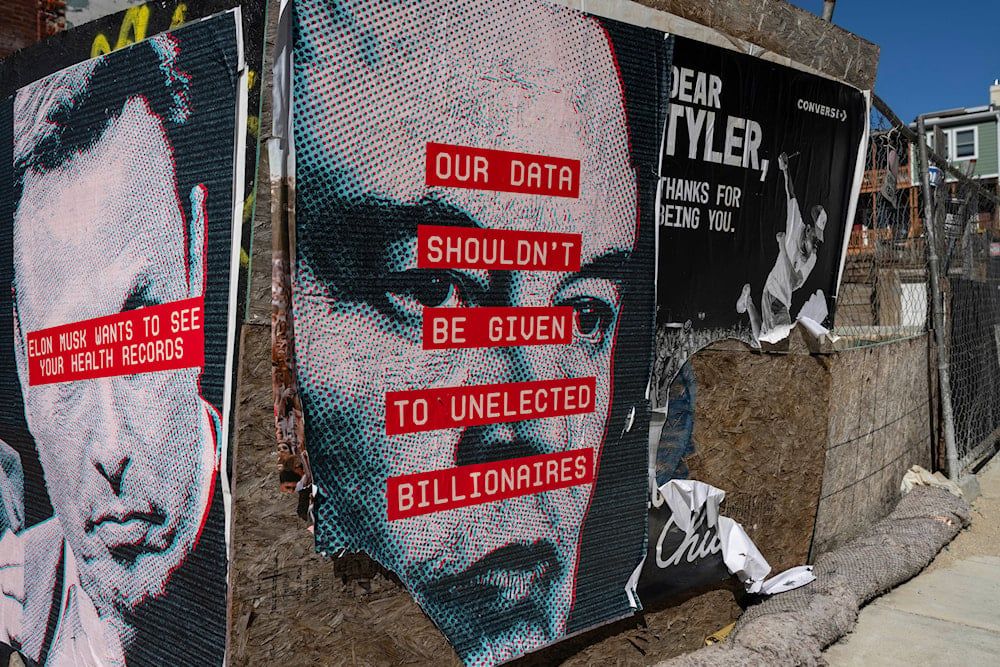Court allows Trump's DOGE team to access sensitive US data
US appeals court lets Trump’s DOGE team access federal data, rejecting privacy concerns from unions and veterans.
-

Posters showing the face of Elon Musk and messages relating to data privacy are seen on a fence surrounding a building site in Washington, Friday, March 7, 2025. (AP)
A US appeals court on Tuesday denied a request from a coalition of unions seeking to prevent the Trump administration's government downsizing initiative, referred to as the Department of Government Efficiency, from accessing confidential information about American citizens.
In a 2-1 ruling, the US 4th Circuit Court of Appeals, based in Virginia, stated that the unions were unlikely to succeed in their argument that the Department of Government Efficiency would breach federal privacy laws by obtaining data from the US Department of Education, the Treasury Department, and the Office of Personnel Management.
The court declined to restrict DOGE's access to the agencies' computer systems and sensitive data, including Social Security numbers and citizenship status information, while the case proceeds, overturning a previous temporary injunction imposed by a Maryland federal judge, which the appeals court had already put on hold back in April.
The agencies involved in the case, as well as the unions that filed the lawsuit, including the American Federation of Teachers and the National Federation of Federal Employees, had not yet responded to requests for comment.
On Tuesday, the 4th Circuit stated that the unions and a group of military veterans who filed the lawsuit had failed to demonstrate how they would suffer harm from DOGE's access to agency computer systems, while also noting they likely lacked legal standing to sue since such access does not constitute a "final agency action" that could serve as grounds for litigation.
In dissent, one judge argued that temporarily restricting access to the data would be a reasonable precaution during the ongoing litigation, while also contending that the majority had set an excessively stringent legal standard for the plaintiffs to meet.
A track record of infringing on privacy
According to a May 3 report by The New York Times, the Trump administration asked the Supreme Court to grant members of Elon Musk’s Department of Government Efficiency (DOGE) access to confidential records held by the Social Security Administration.
The administration contends that the existing limitations, enforced by a federal district court, are hindering essential modernization initiatives and impeding progress toward eliminating government inefficiencies.
The Solicitor General, D. John Sauer, argued in the emergency filing that this case followed a recurring pattern, a district court had overstepped its legal authority by imposing broad injunctions, causing continuous and irreversible damage to critical federal objectives while obstructing the operations of the executive branch.
Judge Ellen Hollander restricted DOGE's access to Social Security records, permitting only redacted or anonymized data after privacy training and background checks, stating that unwarranted intrusion into Americans' personal data violates public interest and legality, even amid fraud prevention efforts.
According to documents reviewed by The Washington Post in April 2025, personnel from DOGE were provided access to a tightly controlled Justice Department system housing comprehensive data on millions of immigrants, including those with and without legal status.
The database, called the Executive Office for Immigration Review’s Courts and Appeals System (ECAS), stores digital records of individuals in US immigration proceedings, including names, addresses, court testimony, and law enforcement encounters.
Before that, in February, DOGE attempted to obtain entry to a highly confidential Internal Revenue Service (IRS) database containing comprehensive financial records of all American taxpayers, businesses, and nonprofit organizations. This sparked alarm in the tax agency, which considered a memorandum of understanding to grant the Department access to sensitive IRS data that includes personal IDs and bank information.

 4 Min Read
4 Min Read










